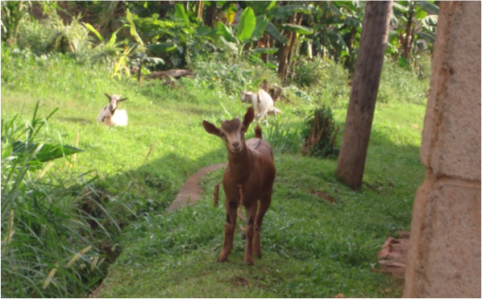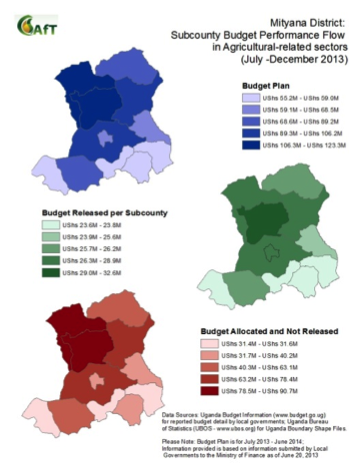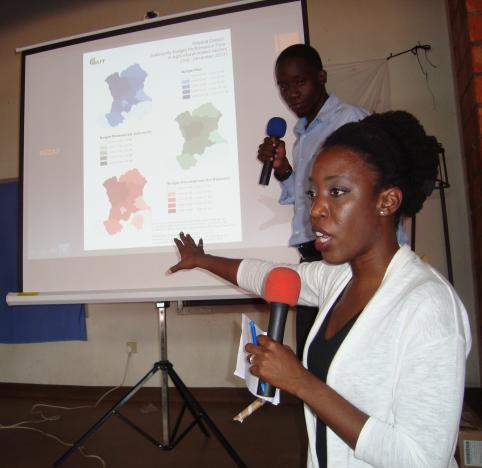Nkechi's reflection captures the real story of farmers whose agency we at the Agency for Transformation are trying to help build. It also illuminates the importance of practical feedback amidst a rosary of official "ritual" anti-corruption institutions that are not delivering. This builds a case for deepening social accountability initiatives and value for money audits. ~Rwakakamba Morrison, CEO, Agency for Transformation

Goats in Ntinda, Uganda
In a small village in northern Uganda, a team of auditors sat down for visits with two smallholder farmers. The topic of conversation: how were things going with the goats they had received from the National Agricultural Advisory Services (NAADS) program? When the farmer’s child translated the question from English to the local language, the farmer looked puzzled. The auditor knew there was a problem.
It soon became clear that the government official administering the NAADS program had bought only one goat, not two, and pocketed the remaining funds. If the auditor had not spoken with the farmer directly, this petty corruption with an outsized impact on that family’s livelihood would likely have gone unnoticed.
Reporting a missing goat may seem like a modest feat, but it illustrates a broader point. The corruption experienced by most citizens is in the numerous small-scale transactions they have with government bureaucrats. In these instances, citizen feedback is essential to ensuring accountability. Farmers, small business owners, students and other citizens are best positioned to provide input and feedback on the policies and services that affect them. That is, assuming communities have ready information on what has been promised versus delivered, as well as access to the mechanisms to provide feedback.
As an AidData Summer Fellow, I’m working with the Agency for Transformation (AfT), a Ugandan think and do tank, to find ways in which smallholder farmers can make use of public budget information being made available by the Ugandan government. For example, the Ugandan Budget Information website allows you to view budget allocations not only at the district level but down to the parish level (equivalent to a city or a village). Local governments can report status updates on the use of received funds and the public can post feedback regarding the delivery of services.
Unfortunately, Uganda’s public budget portal is having mixed results thus far. While local governments are reporting status updates, feedback on service-delivery from community members is mostly non-existent due in no small part to limited internet access which makes using such tools difficult for most rural farmers.

The data represented in the above maps are from the Ugandan Budget Information websitemanaged by the Ministry of Finance Planning and Economic Development.
Speaking with a diverse group of small business entrepreneurs, politicians, students, farmer association representatives, and smallholder farmers in Mityana recently confirmed this gap between publishing information, putting it to use and providing feedback. I described how mapping (or geocoding) Uganda’s annual budget helps visualize the flow of designated funds (or the lack thereof) from the national government to each community. I then asked for those attending the meeting for their thoughts about the information they needed to make informed decisions regarding their own activities in the agricultural sector. The responses were overwhelming, especially those pertaining to NAADS, as one person after another spoke of their experiences. One offered a similar animal-swap account involving cows. Another spoke of how sick pigs were delivered to her farm only to die a couple of hours later.

Nkechi wrapping up AfT presentation
It’s clear that rural agricultural communities don’t yet have adequate means of supplying feedback on government initiatives, even with the formal monitoring and auditing process. Just as it took a meeting of the auditor and the farmer to report a missing goat, citizens are critical allies in the fight against corruption. But at present their voices aren’t being heard. The challenge for the Agency for Transformation and other civil society organizations will be to find ways to serve as an information broker between policymakers and smallholder farmers in the hopes of reducing the barriers to providing meaningful feedback. AfT continues to make strides to address this challenge head on.
